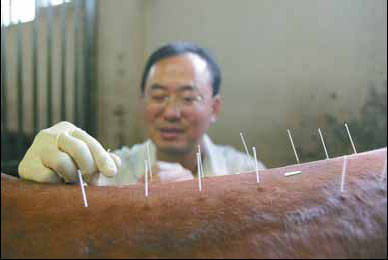How to needle a horse
 |
|
Modern equestrian medicine is falling back to the ancient art of acupuncture. Dr Lawrence Chan is one of two vets using acupuncture to treat horses in competition in Hong Kong. Provided to China Daily |

More and more horses in international competition are making use of an ancient Chinese healing art to stay healthy and fit. Rebecca Lo talks to Lawrence Chan, one of two equine acupuncturists in Hong Kong.
Dr Lawrence Chan takes out his kit of acupuncture needles and considers his patient, a beautiful chestnut thoroughbred mare. After donning yellow rubber gloves, he inserts 45mm to 50mm long needles one by one into her back. He works quickly. He has a time span of 30 minutes before the mild tranquilizer begins to wear off.
In another weeks' time, he will repeat the procedure, for up to four consecutive weeks.
But most owners would prefer that he cuts down his treatment to two acupuncture sessions in as many weeks, so that their prized racing machines can return to the track and win big again. Whether in pursuit of an Olympic medal or hard cash, horseracing and equestrian sports are big businesses in Hong Kong. And they are sports that the city has been perfecting for nearly 130 years.
Chan has worked for The Hong Kong Jockey Club's Veterinary Clinical Services for 21 years. He studied veterinary science at The University of Melbourne. After returning to Hong Kong, he worked for a year in a small animal clinic before joining HKJC's team.
| |||
"After I was hired, I was sent to England for six months to observe how equestrian vets worked," Chan recalls.
The team of 14 vets at the Equine Hospital is an international smorgasbord of nationalities, with Irish, English, South African, Australian, New Zealand and local Hong Kong staff headed by Dr Chris Riggs. The team is subdivided into racing veterinary surgeons and equestrian veterinary services, with the latter responsible for retired racehorses and privately owned horses and ponies in the city's riding schools.
Together, they are responsible for some 1,800 horses across Hong Kong.
As a racing vet surgeon, Chan saw that many Western medical practices were covering up injuries that some horses sustained, and he decided to look at alternative methods of healing.
"Lame horses or those with back pain are difficult to treat," he says. "Once we stop their medication, the pain returns. Medicine only masks the pain, so I thought I'd try acupuncture."
He took a night course at Hong Kong School of Continuing Education in human clinical acupuncture and received a diploma on the subject in 2003. He continued learning acupuncture specifically for horses at The University of Florida, studying under Beijing acupuncturist Huisheng Xie, who was a senior lecturer at the school.
After returning to Hong Kong, he started using acupuncture on HKJC's horses in 2004. Today, he is one of two equine acupuncturists in Hong Kong; the other is Austrian Suzanne Lam, who is in private practice.
"The biggest difference between human and equine acupuncture is that with people, when you tell them not to move, they don't move," Chan says.
"Horses are not going to listen to you, so we administer a mild tranquilizer beforehand. The other difference is that acupuncture in people can be enhanced with moxibustion, which we don't do with horses. In humans, needles are typically left in for an hour while the tranquilizer that we use on horses only lasts for half an hour, so that's how long the session is. Since the tranquilizer is a prohibitive substance, we have to stop treatment four days before a race."
After practicing acupuncture on HKJC's horses for eight years, Chan has a deft technique that maximizes the time the horses receive treatment. He applied the technique to his most recent experience at the 2010 Asian Games' equestrian events, when he was the veterinary services manager and responsible for the well being of all the horses racing in Guangzhou.
"For the Asian Games, I lived in Guangzhou for a month," he recalls. He also worked with Riggs at the 2008 Olympic Games' equestrian events in Hong Kong.
As neither Hong Kong nor China is represented at the Olympic Games in London, there will not be any vets from HKJC going to England this year.
However, equine acupuncture is popular in the United States and Great Britain.
"We do have one horse participating in the Paralympic Games in London," Chan notes. "The horse is based in London and the rider is Natasha Cheng, a 15-year-old girl from Hong Kong."
"Some horses are more receptive to acupuncture than others," says Chan. "Plus, it doesn't work for every ailment. If I think that its origin is somewhere other than a horse's back, I'll use other treatment methods. Back pain does not necessarily stem from the back of an animal."
Despite his very sought-after alternative medicine skills, Chan only works on HKJC horses. "I don't have time to practice on any other horses," he says. His 30 dogs and 20 cats, all adopted strays, also keep the animal lover busy enough.

























